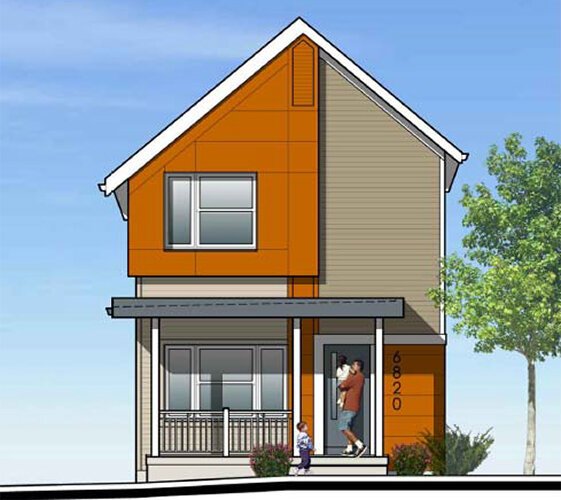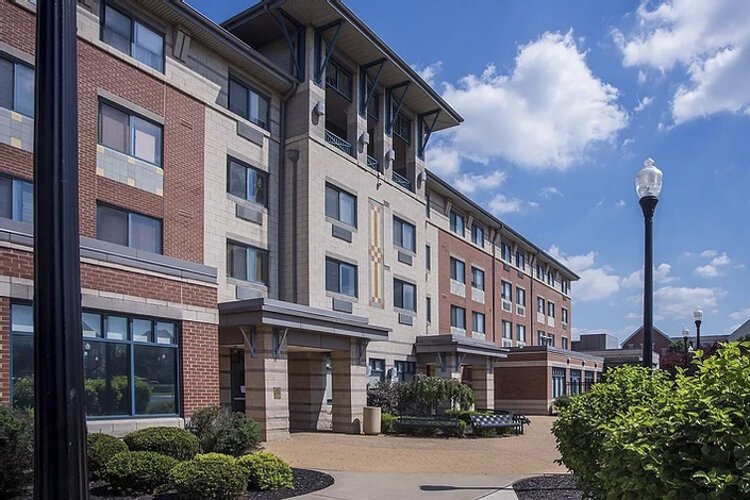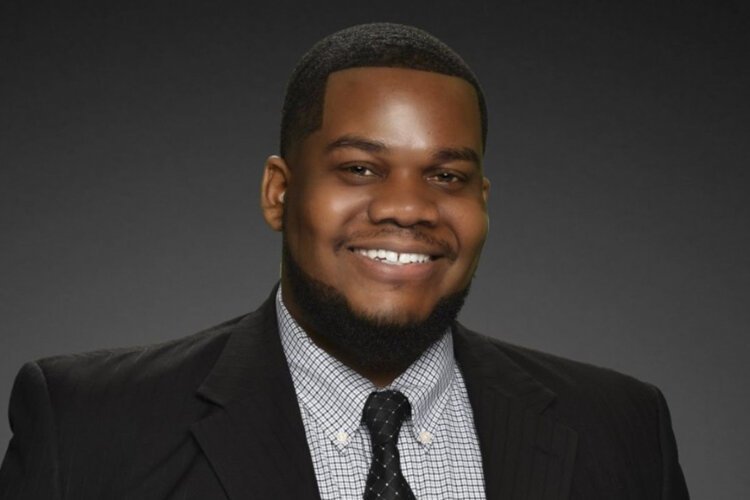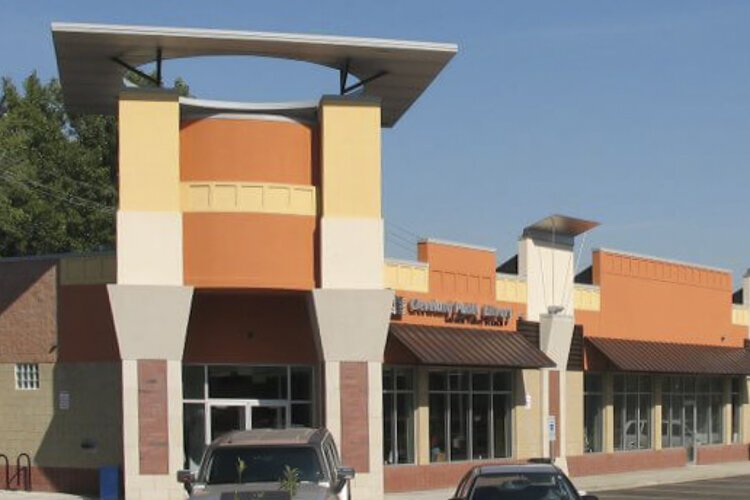An impactful return: Burten, Bell, Carr’s new real estate development manager has big plans
Joy Johnson remains surprised that she did not know Russell Underwood before interviewing and hiring him as Burten, Bell, Carr Development’s (BBC) new real estate development manager. If she did, he might have been in place much sooner.
“He’s definitely worthy to be sought out, but I didn’t know he existed,” says Johnson, the organization’s executive director. “Finding him was a silver lining of [the pandemic].”
The two have many of the same professional contacts, and Underwood even previously worked as a property manager in one of the three neighborhoods (Buckeye, Central, and Kinsman) served by BBC. However, Johnson and Underwood never crossed paths back then, and that will continue until Underwood physically relocates to Cleveland in April.
The organization announced the hire in January, but Underwood will continue his duties virtually from the Columbus area, where he further honed his real estate experience over the past few years.
 Because community development corporations (CDCs) like BBC thrive off personal connections and an on-the-ground presence—especially when they onboard new employees responsible for projects that will impact entire neighborhoods—beginning a new role remotely is not ideal.
Because community development corporations (CDCs) like BBC thrive off personal connections and an on-the-ground presence—especially when they onboard new employees responsible for projects that will impact entire neighborhoods—beginning a new role remotely is not ideal.
However, Underwood, a Cleveland native who used to work at nearby Arbor Park Village, needed little acclimation. Johnson has already seen his personable nature and initiative at work from a distance.
He recently attended the Cleveland Police Department Fourth District’s monthly Zoom meeting to introduce himself, represent BBC, and request attention to under-construction homes in the area that had been vandalized. The homes are part of BBC’s ongoing Colfax Family Homes project, which will bring 36, single-family homes to the area just one block north of the BBC offices at 7201 Kinsman Road.
During the Fourth District Zoom meeting, Underwood casually sent a private message to the commander about the matter, so as not to derail the meeting. Johnson says the gesture exemplified Underwood’s personality and dedication to the neighborhood.
“One of the things I value about Russell is he’s got the real estate expertise and the human expertise and interaction,” Johnson says. “Russell was able to see, ‘this is my opportunity to connect to the police for a lot of things, but also because we’re having this particular issue.’ I didn’t have to ask him to attend or assign it to him. He saw the opportunity and went for it.”
‘A whole different outlook’
Underwood grew up on Cleveland’s west side before his family moved to Lorain, where he attended high school. His exposure to real estate came as an 18-year-old college student in Toledo where he juggled courses with a job as a leasing agent making $8 per hour. He was merely trying to get by, but his employer encouraged him to pursue a future in the industry, going as far as telling him that he could one day be an executive at the company.
“I couldn’t see that far,” Underwood recalls. “I really couldn’t.”
 BBC’s ongoing Colfax Family Homes projectUnderwood took note of the comment and continued to advance his career. By age 24, he began managing a luxury housing community in Columbus. He soon realized that working in wealthy communities did not provide the challenge he was looking for or the potential to impact as many lives.
BBC’s ongoing Colfax Family Homes projectUnderwood took note of the comment and continued to advance his career. By age 24, he began managing a luxury housing community in Columbus. He soon realized that working in wealthy communities did not provide the challenge he was looking for or the potential to impact as many lives.
Word spread around the industry and state that he was unafraid to work in far less fortunate communities, which led to his first move back to Cleveland. He worked as a property manager at Arbor Park, a development located in the same ward as BBC, near the intersection of Woodland Avenue and East 40th Street.
From professional growth to nearby gang violence, Underwood recalls facing many challenges, but he has no regrets.
“I had a lot of work to do to gain respect and hit the ground running,” he says. “That property gave me my platform to move up because it was 629 units, I had over 3,000 residents total, counting kids, and that gave me a whole different outlook when I tried to move up the ranks.”
Next, he moved back to Central Ohio to become a regional manager responsible for a portfolio of 19 affordable housing communities. The role in Cleveland gave him a greater understanding of how his work affected the residents of those properties.
“When I worked at Arbor Park, I was very defensive about that community— my attitude was to speak for those people there that I felt like didn’t have a voice or that nobody wanted to listen to,” says Underwood. “My attitude was that just because people were poor or below the poverty level, that didn’t mean that people were uneducated or didn’t have talent or the kids weren’t talented. I was big on trying to showcase that it’s not what you think, and that people need an opportunity.”
The work became personal and ultimately shaped his second stint in the Columbus area and let him know he had the potential for success at a CDC. However, a second post-collegiate return to Northeast Ohio was not part of Underwood’s initial plan. He wanted to relocate to Dallas, but nothing panned out there. He says he jumped at the opportunity to come to Cleveland when he learned about the BBC opening.
“I think the timing was perfect,” Johnson says. “Russell is still able to have an impact even though he hasn’t moved here yet.”
 Russell Underwood, a Cleveland native used to work at nearby Arbor Park Village.The path to a CDC
Russell Underwood, a Cleveland native used to work at nearby Arbor Park Village.The path to a CDC
Underwood’s most recent job before BBC was at a large, private firm with affordable housing properties in six states. In his experience, that kind of corporate structure does not allow for the intimate knowledge of the communities that larger management companies have properties in. While some nonprofit leaders and city officials have pointed out CDCs’ ability to take on real estate projects that municipalities often cannot, Underwood believes the connectivity these organizations have with their neighborhoods is what truly makes them unique and special.
“In that world, you are very much disconnected from the people and population you serve,” he says. “It’s an easy vision of, ‘we come in, we build, develop, we sit back, collect our management fees and go on about our lives.’ In the CDC world, they are the community.”
Underwood became further connected to the Central Ohio communities he worked in by volunteering for organizations like Partners Achieving Community Transformation and the City of Columbus' Near East Side Leadership Academy, which included a program where he provided meals and hygiene packages to the area’s homeless population. He also recently graduated from United Way of Central Ohio's Project Diversity program.
“Once I came to the whole affordable housing sector, I noticed that the role of being a manager, if you really care, you’re going to have to do a little bit more,” he says. “As a leader, people saw me in the community picking up garbage, and people began saying, ‘oh, he’s not just here on a 9 to 5 [job]. That’s where I felt like I had influence as a leader … you have to lead effectively and stand behind what you say.”
What’s next?
BBC first received funding for Colfax Family Homes in 2017, including $8.25 million in housing tax credits from the Ohio Housing Finance Agency. Underwood believes the first four of 36 homes should be fully constructed by the end of March. Underwood is excited to bring that project to life and find more ways to expand affordable housing in the area.
“I think the next wave of housing that’s important is to gear things to our seniors,” Underwood says. “I think that our next thing will be focusing on some type of development that can be geared towards them–people who are retirement age and can’t pay $1,500 per month for a one-bedroom [home].”
Underwood also looks forward to working with BBC economic development manager William Willis on providing opportunities like wraparound services, assistance with starting small businesses, or potentially creating a learning center.
“He’s a great addition to our team,” Willis says of Underwood. “He’s an individual that understands and gets the work and what kind of needs and assets could be brought to the community.”
Johnson says adding Underwood to the staff will help the organization find partners to keep projects moving along and bring developments to their neighborhoods at a faster rate. Those relationships will help with execution when BBC creates a plan for the Buckeye neighborhood, much like the Kinsman and Central Neighborhood Plan it created in 2016.
“Ultimately, what I would like for the organization to do is partner with real estate developers who have that expertise in how to manage real estate deals on the for-profit side,” Johnson says. “We bring the expertise and the connection to resources of how to make a real estate development deal work on the nonprofit side. We will be able to bring more real estate development to the neighborhoods that we serve—really, more strategic partnerships so that we have more production so that we have more bricks and mortar to keep up with the demand.”
Underwood believes these aspirations, coupled with his real estate work, can create a blueprint for opportunities and independence for Buckeye, Kinsman, and Central residents who need it the most.
“In the development world, a lot of people are blinded by this whole deal structure—it’s all about the deal,” he says. “They forget about the people. They forget that once you’re done with this project, 10 years from now, people have to live there and utilize this space, but we are thinking that way. How can people benefit from what we do?”
This story is part of FreshWater’s new yearlong series, Community Development Connection, in partnership with Cleveland Neighborhood Progress and Cleveland Development Advisors and funded in-part by a Google Grant. The series seeks to raise awareness about the work of 29 Community Development Corporations (CDCs) as well as explore the efforts of neighborhood-based organizations, leaders, and residents who are focused on moving their communities forward during a time of unprecedented challenge.
.jpg)


